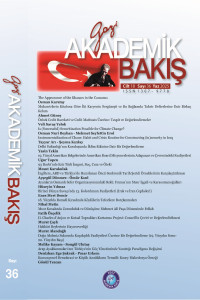Abstract
Bu çalışma, Irak’ı oluşturan çeşitli kimlik grupları arasındaki ilişkilerin ve ülkede bağımsızlık sonrası süreçte yaşanan gelişmelerin bir ‘kriz rutini’ oluşturduğunu ve ‘rutinler aracılığıyla alışkanlığın’ ontolojik güvenlik sağladığını savunmaktadır. Bu bağlamda çalışma, Irak’taki ontolojik güvenliği, toplumsal grupların temel tehdit algıları ve geliştirdikleri alışkanlıklar aracılığıyla açıklamaktadır. Uluslararası ilişkilerde nadir kullanılan, psikoloji ve sosyoloji temelli bir kavram olan alışmışlık olgusunun ontolojik güvenlik çalışmaları için de farklı bir bakış açısı sunarak literatüre katkı sunması amaçlanmaktadır. Bu anlamda kavram rutin kavramının derinleştirilmesi çerçevesinde kullanılacaktır. Çalışma, Irak’taki krizin rutinleşmesinin, mevcut toplumsal aktörlerin kimliğini koruyarak varlığını sürdürdüğü ve krizin devamına bağlı olan bir istikrar biçimi yarattığını ortaya koymaktadır. Irak’taki büyük ölçekli krizler, farklı kimlik gruplarını etkileyen olaylar ve rutini bozan ve belirsizliğe neden olan gelişmeler, kriz rutini kavramıyla açıklanacaktır. Kriz rutini düzeninin toplumda oluşturduğu alışmışlık düzeyleri toplumun farklı kesimlerinde çeşitli sonuçlar üretmektedir. Kimlik kapsamındaki alışmışlık ise ülke bileşenlerinden biri olan Şii kesimin ontolojik güvenlik algıları ile örneklendirilecektir. Bu tehlikeli alışkanlıklar aynı zamanda ortak bir Irak kimliğinin benimsenmesini de engellemektedir.
References
- AGIUS, Christine, “Drawing the Discourses of Ontological Security: Immigration and Identity in the Danish and Swedish Cartoon Crises.” Cooperation and Conflict, 2016 LII/1, 109-125.
- ABURISH, Said K., Saddam Hussein: The Politics of Reveng, Edinburgh: Clays Ltd, 2000.
- AKIN, Soner, Ontological Insecurity and Regionalism in the Middle East, IKSAD, 2022.
- AKOĞLU, Muharrem, “Irak’ta Şii Varlığı”, Mezhep Araştırmaları, VI/2, 2013.
- ALAALDIN, Ranj and Sumaya Attia, “Shiite militias in Iraq: Why Context Matters”, Brookings, 2017, https://www.brookings.edu/articles/shiite-militias-in-iraq-why-context-matters/.
- ALAOLMOLKI, Nazor, “The New Iranian Left”, The Middle East Journal, XLI/2 Spring 1987, pp. 218-233.
- ALKOPHER, Tal Dingott, “Socio-psychological Reactions in the EU to Immigration: From Regaining Ontological Security to Desecuritisation”, European Security XXVII/3, 2019, pp. 314-335.
- AL-QARAWEE, Harith Hasan, الأزمة ا لط ائفیة في ا لعر اق :إ رث من ا لإ قص اء (al’azmat altaayifiat fi aleiraqi: ‘iirth min al’iiqsa’) 23/04/2014, https://carnegieendowment.org/sada/?fa=55405&lang=ar
- AL-QARAWEE, Harith Hasan, “Sectarian Identities, Narratives and Political Conflict in Baghdad”, The Levantine Review, IV/2, 2015.
- ARI, Tayyar and Mehmet Ali Ak, “Ontological Security Theory and the Security of Self,” in Tayyar Arı (ed.) Critical Theories in International Relations, 1st Edition, London, New York: Lexington, 2023, pp. 169-188.
- ARI, Tayyar, Geçmişten Günümüze Ortadoğu: Siyaset, Savaş ve Diplomasi, 6th Edition Bursa: MKM Yayınları, 2012.
Abstract
This study argues that the relations between the various identity groups that constitute Iraq and the developments experienced in the country after independence constitute a ‘crisis routine’ and that ‘habit through routines’ provides ontological security. In this context, the study explains ontological security in Iraq through the basic threat perceptions of social groups and the habits they have developed. It is aimed to contribute to the literature by offering a different perspective for the ontological security studies of the phenomenon of habituation, which is a concept based on psychology and sociology and rarely used in international relations. In this sense, the concept will be used within the framework of deepening the concept of routine. The study reveals that the routinization of crisis in Iraq creates a form of stability that maintains the identity of existing social actors and depends on the continuation of the crisis. Large-scale crises in Iraq, events affecting different identity groups and developments that disrupt the routine and cause uncertainty will be explained with the concept of crisis routine. The levels of habituation created by the crisis routine order in society produce various results in different segments of society. Habituation within the scope of identity will be exemplified by the ontological security perception of the Shiites, one of the country’s components. These dangerous habits also prevent the adoption of a common Iraqi identity.
References
- AGIUS, Christine, “Drawing the Discourses of Ontological Security: Immigration and Identity in the Danish and Swedish Cartoon Crises.” Cooperation and Conflict, 2016 LII/1, 109-125.
- ABURISH, Said K., Saddam Hussein: The Politics of Reveng, Edinburgh: Clays Ltd, 2000.
- AKIN, Soner, Ontological Insecurity and Regionalism in the Middle East, IKSAD, 2022.
- AKOĞLU, Muharrem, “Irak’ta Şii Varlığı”, Mezhep Araştırmaları, VI/2, 2013.
- ALAALDIN, Ranj and Sumaya Attia, “Shiite militias in Iraq: Why Context Matters”, Brookings, 2017, https://www.brookings.edu/articles/shiite-militias-in-iraq-why-context-matters/.
- ALAOLMOLKI, Nazor, “The New Iranian Left”, The Middle East Journal, XLI/2 Spring 1987, pp. 218-233.
- ALKOPHER, Tal Dingott, “Socio-psychological Reactions in the EU to Immigration: From Regaining Ontological Security to Desecuritisation”, European Security XXVII/3, 2019, pp. 314-335.
- AL-QARAWEE, Harith Hasan, الأزمة ا لط ائفیة في ا لعر اق :إ رث من ا لإ قص اء (al’azmat altaayifiat fi aleiraqi: ‘iirth min al’iiqsa’) 23/04/2014, https://carnegieendowment.org/sada/?fa=55405&lang=ar
- AL-QARAWEE, Harith Hasan, “Sectarian Identities, Narratives and Political Conflict in Baghdad”, The Levantine Review, IV/2, 2015.
- ARI, Tayyar and Mehmet Ali Ak, “Ontological Security Theory and the Security of Self,” in Tayyar Arı (ed.) Critical Theories in International Relations, 1st Edition, London, New York: Lexington, 2023, pp. 169-188.
- ARI, Tayyar, Geçmişten Günümüze Ortadoğu: Siyaset, Savaş ve Diplomasi, 6th Edition Bursa: MKM Yayınları, 2012.
Details
| Primary Language | English |
|---|---|
| Subjects | International Security, International Relations (Other) |
| Journal Section | Articles |
| Authors | |
| Publication Date | June 16, 2025 |
| Submission Date | January 4, 2025 |
| Acceptance Date | May 20, 2025 |
| Published in Issue | Year 2025 Volume: 18 Issue: 36 |
Cite
Gazi Akademik Bakış Dergisi Creative Commons Atıf-GayriTicari 4.0 Uluslararası Lisansı ile lisanslanmıştır.


